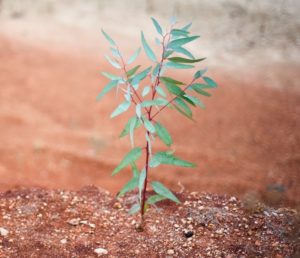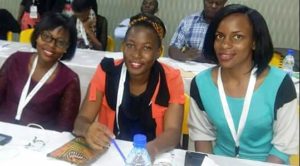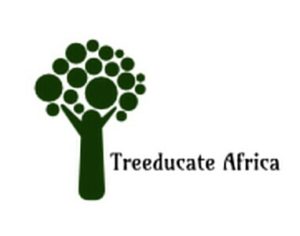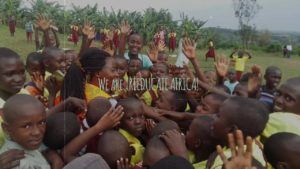
The earth gives a lot to those who inhabit it—food, water, air, and shelter. But thanks to a new initiative by Fellows Jovia Apio, Namata Tendo, and Shanim Ggombe, it is also giving communities a chance at an education.

Treeducate Africa is the brainchild of Building Tomorrow Fellows Namata Tendo, Jovia Apio, and Shanim Ggombe (left to right).
The initiative, called Treedcucate Africa, aims to empower parents in rural areas to support their children’s education through the establishment of community forests in the long-term and through savings and loans groups in the short-term.
“It’s giving hope to the community,” says Jovia. “People need to realize that they have resources in the community, and they can tap into those resources to educate their children.”
In a country where almost 84% of people live in rural areas, one of the greatest resources people have is land. So maximizing its production efficiently is key to reducing poverty and funding education in even the hardest-to-reach areas, and commercial tree planting is a lucrative venture if done successfully.
To help Treeducate Africa succeed at this venture, the School Foundation Body of the Anglican Church donated one acre of land to Kyampangara Primary School—one of the four schools at which Jovia works. Wasting no time, Jovia and her colleagues have already worked with district officials to acquire and put 50 local-variety Eucalyptus trees in the ground. The tree species, known for its straight pole wood, has a huge market in Uganda and East Africa broadly, as the region struggles to keep up with demand for raw materials for house construction and furniture.

Treeducate Africa is a youth-led social initiative that promotes access to quality education for children in excluded communities of Uganda.
Once mature and sold, it is Treeducate Africa’s hope that the proceeds can be used to set up what it calls “Tree Investment Baskets”—bank accounts at each school of accumulated tree sales revenue that can be used to clear the school fees of each student. The accounts would lift a huge burden off the backs of rural parents, whose children are often forced to drop out of school due to an inability to pay such fees. The hope is that by creating stands of trees, they can take a stand against climate change and poverty in their communities as well.
But school fees are a problem now, and communities cannot wait years for the trees to mature. That’s why Treeducate Africa also trains communities to take advantage of another community resource—its people.
Mobilizing communities to start village savings and loans groups, Treeducate Africa is helping communities to look towards each other to lift their families out of poverty and keep their children in school.
“They will tell you they don’t have money,” Jovia says. “But when you sit with them and identify their basic needs, they’ll see there is an outstanding balance. And you have to ask: What are you prioritizing it on? It was one way to have it click for them.”
Treeducate Africa trains community members on how to start and manage a village savings and loan group, identify costs and revenue, and balance a budget.
The 13-parent village and savings loan group at Kyampangara Primary School has already saved over 800,000 Ugandan shillings (about $217) and successfully cleared the school fees of 25 children.
But Treeducate Africa is not just about instilling a savings and loan culture; it’s about instilling that culture for a purpose—the benefit of the child.
“We build a bond with the parents,” Jovia explains. “We teach them mindset change.”

Treeducate Africa currently partners with 4 public primary school communities across Kiruhura District in Western Uganda.
Treeducate Africa does this by promoting a practice it calls “30 Minutes My Child” in its savings and loan groups, whereby parents agree to dedicate 30 minutes each day to thinking about and writing down what they want for their child—their goals for the day, month, and even year. Then, when the groups convene for their meetings, each parent comes back and shares his or her goals as a way to motivate others to begin to see things like education as valuable for their children’s futures.
Once education is identified as a household priority, it’s a matter of saving. “You can save 300 or even 500 shillings per day. Start putting it in a tin,” says Jovia. And over time, parents have a safety net and investment fund for their children’s needs.
In the future, Treeducate Africa hopes to be more involved with imparting other investment guidance to parents and even register itself as a legal entity in Uganda. But for now, Treeducate Africa is growing trees and possibilities for Uganda’s children through its mixed short and long-term model promoting rural education.
“It’s a game of patience,” says Jovia. “Trees take time to grow. And as we wait, we’re trying to fight the war of mindset change.”
And fight the war they are! The initiative is capturing the minds of the communities one meeting at a time and the carbon as well. So today, on Earth Day, we celebrate Treeducate Africa, its innovation in leveraging Earth’s resources and people towards the cause of children’s education, and the impacts it is making in Uganda’s rural communities.

Follow Us on Social Media